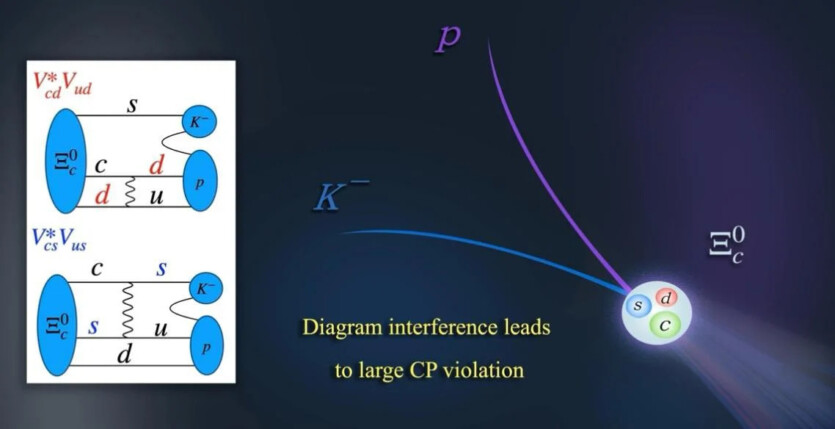
Matter in the Universe prevails over antimatter. This issue has long been a concern of scholars from around the world.
A new study by Chinese scientists of the Zundao Li Institute (TDLI) at Shanghai University predicts significant disruption effects CP symmetries during decay of charmed baryons. This may help answer the question of why matter in the Universe prevails over antimatter.
Previous studies have shown an unexpectedly significant disruption CP symmetry during the decay of charmed mesons. However, similar studies with charmed baryons have not yielded such unambiguous estimates
In this regard Prof. Xiao-Gang He and Dr. Jia-Wei Liu of the Zundao Li Institute have applied the SU(3) flavor symmetry theory in combination with a process called by backscattering in the final state. The results of this study suggest that the CP symmetry violation during the decay of charmed baryons may be much more pronounced, than expected.

The researchers emphasize that backscattering plays a key role in the phenomena of excitation CP symmetry. This mechanism promotes efficient re-interaction between particles, generating powerful phases necessary to break CP symmetry. Predictable asymmetry of matter and antimatter in the decays of charmed baryons can reach the level of one thousandth, which is much higher than previous theoretical estimates.
«Studies of CP-symmetry breaking in the field of enchanted subatomic particles open new avenues for experimental research and allow for a deeper understanding of the fundamental mechanisms underlying the asymmetry of matter and antimatter in the Universe. This opens up important opportunities for further testing of the Standard Model and potential discoveries in the field of new physics», — explains Head of the Department of Elementary Particle and Nuclear Physics at the Institute of Elementary Particle Physics, Professor Xiao-Gang He.
The results of the study open up prospects for experimental verification. Currently, experiments such as BESIII, LHCb and Belle II already have some detection capabilities. China’s upcoming Super Tau-Charm Facility (STCF) is expected to significantly increase the sensitivity, providing continued support for the physics community’s cutting-edge research.
Source: SciTechDaily

Spelling error report
The following text will be sent to our editors: